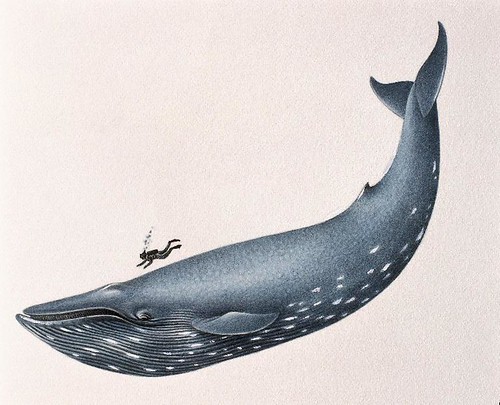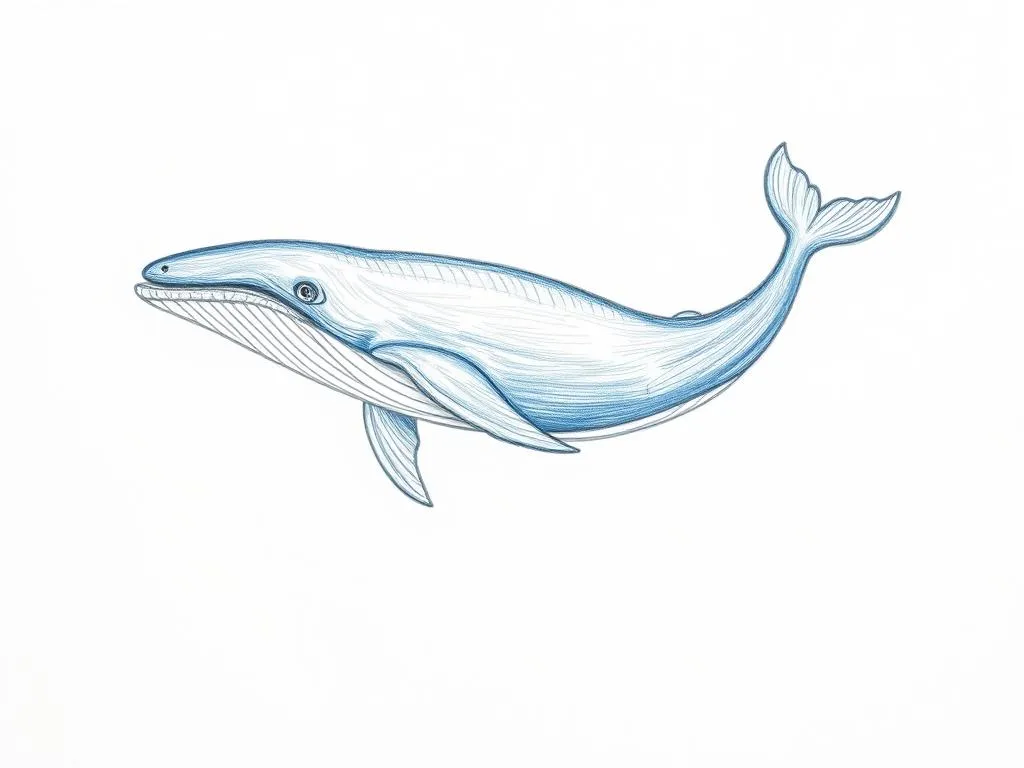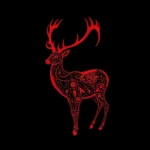The Majestic Blue Whale: Symbolism and Spiritual Significance

Disclaimer: Some images on this website are AI-generated artworks and may not accurately represent real animals.
The blue whale stands as the largest animal to ever inhabit our planet, a true titan of the oceans. Beyond its physical grandeur lies a wealth of symbolism and meaning that resonates deeply within various cultures and spiritual contexts. This article delves into the profound significance of the blue whale, exploring its physical characteristics, habitats, and the rich tapestry of symbolism associated with it.
Understanding the Blue Whale
Physical Characteristics
The blue whale is an awe-inspiring creature, notable for its immense size and striking features. Here is a detailed overview of its physical characteristics:
| Feature | Description |
|---|---|
| Length | Up to 100 feet (30 meters) |
| Weight | Up to 200 tons |
| Coloration | Bluish-grey with lighter spots |
| Dorsal Fin | Small and located towards the back |
| Blow | Up to 30 feet high, visible from great distances |
| Baleen Plates | Long, fringed plates for filtering krill |
The blue whale’s coloration provides it with camouflage in the ocean depths, blending seamlessly with the surrounding water and light patterns. Its sheer size and unique physical features make it an icon of strength and grace.
Habitat and Behavior
Blue whales inhabit the vast oceanic environments, primarily found in deep, open waters. They migrate long distances, often traveling thousands of miles between feeding and breeding grounds. Their feeding habits are particularly fascinating; these gentle giants consume vast quantities of krill, using their baleen plates to filter out their prey from the water.
Blue whales are known for their solitary nature but can also be found in small groups. Their migration patterns are influenced by seasonal changes, leading them to warmer waters during breeding seasons and colder waters for feeding.
Cultural Significance
Throughout history, the blue whale has captured the imagination of many cultures. In various indigenous myths and legends, the whale symbolizes strength, survival, and the interconnectedness of life. For some cultures, the blue whale is revered as a guardian spirit or a symbol of transformation and renewal.
In modern culture, the blue whale often represents the fragility of our oceans, serving as a reminder of the delicate balance required for marine ecosystems to thrive. This majestic creature has inspired countless works of art, literature, and music, enriching human culture with its profound presence.

Symbolism & Spiritual Meaning
Wisdom and Knowledge
The blue whale is often regarded as a keeper of ancient wisdom. Its long lifespan, with some individuals living over 80 years, symbolizes the accumulation of life experiences and knowledge. In many spiritual traditions, the presence of a whale signifies a call to connect with deeper wisdom and understanding.
The blue whale’s ability to navigate vast oceans mirrors our own journeys through life. It encourages individuals to seek knowledge, embrace learning, and foster a deeper understanding of themselves and the world around them.
Emotional Depth
The vastness of the ocean parallels the emotional depth associated with the blue whale. This creature symbolizes the importance of emotional health and the exploration of our inner selves. Just as the blue whale dives into the depths of the ocean, we too are encouraged to explore the depths of our emotions.
In times of turmoil or uncertainty, the blue whale serves as a reminder to acknowledge our feelings and embrace emotional authenticity. It encourages us to dive deep into our experiences, confronting our fears and traumas to emerge stronger and more resilient.
Communication and Song
One of the most captivating aspects of the blue whale is its vocalizations. Known for producing the loudest sounds of any animal, blue whales communicate through a series of calls and songs that can travel long distances underwater.
In spiritual contexts, the blue whale’s song represents the significance of communication and expression. It symbolizes the power of voice and the importance of sharing our truths with others. The whale’s vocalizations remind us that communication is a vital aspect of our connections with one another and with nature.
Connection to Nature
The blue whale epitomizes the interconnectedness of all living beings. As a keystone species, the health of blue whale populations is indicative of the overall health of marine ecosystems. Their presence in the ocean highlights the delicate balance of life and the importance of preserving our natural world.
By embodying this connection, the blue whale inspires us to reflect on our relationship with nature. It encourages us to consider our impact on the environment and to engage in practices that promote ecological sustainability.
Blue Whale in Dreams
Dream Interpretations
Dreaming of a blue whale can carry profound meanings, often reflecting our innermost thoughts and feelings. Here are some common interpretations associated with blue whale dreams:
| Dream Scenario | Interpretation |
|---|---|
| Swimming with a blue whale | Embracing emotional depth and connection |
| A blue whale breaching the surface | A breakthrough in personal growth |
| Being chased by a blue whale | Fearing overwhelming emotions or experiences |
| Observing a blue whale from a distance | A desire for introspection and self-discovery |
These interpretations highlight the blue whale’s role as a symbol of transformation, emotional exploration, and self-discovery.
Symbol of Transformation
The blue whale serves as a potent symbol of transformation in dreams. Encountering this magnificent creature can signify significant changes in one’s life, urging individuals to embrace new opportunities and personal growth.
Whether it be a career shift, a change in relationships, or a deeper understanding of oneself, the presence of a blue whale in dreams often calls for reflection and acceptance of the transformative process.
Exploration of the Subconscious
Dreaming of a blue whale can also represent a journey into the subconscious mind. The act of diving deep into the ocean mirrors our exploration of hidden emotions, unresolved issues, and untapped potential. The blue whale encourages us to confront our fears and delve into the depths of our psyche for self-discovery.
By navigating these deep waters, we can emerge with newfound clarity and insight, ultimately leading to personal growth and empowerment.
Modern Interpretations
Environmental Symbolism
In contemporary society, the blue whale has become a powerful symbol of environmental awareness and conservation efforts. As the largest living creature on Earth, the blue whale highlights the importance of protecting marine ecosystems. Their plight due to climate change, ocean pollution, and commercial whaling serves as a rallying cry for environmentalists and advocates alike.
The blue whale embodies the urgent need for conservation, urging us to take action to protect our oceans and the diverse life that inhabits them. Their majestic presence reminds us of the beauty and complexity of marine life, fostering a sense of responsibility for future generations.
Mental Health Advocacy
The symbolism of the blue whale extends into the realm of mental health advocacy. As a creature that embodies emotional depth and resilience, the blue whale serves as a reminder of the importance of mental well-being. Its presence encourages individuals to prioritize emotional health, seek support, and engage in self-care practices.
By embracing the blue whale’s teachings, we can foster a culture of emotional awareness and healing. This creature inspires us to share our stories, support one another, and break the stigma surrounding mental health issues.
Art and Literature
The blue whale has left an indelible mark on contemporary art and literature. Its grandeur and mystery inspire artists, writers, and musicians, leading to the creation of works that explore themes of nature, connection, and the human experience.
In literature, the blue whale often symbolizes adventure and exploration, serving as a powerful metaphor for the quest for knowledge and understanding. Artists use its majestic form to convey messages about environmental conservation and the beauty of the natural world.
Through various artistic expressions, the blue whale continues to inspire and provoke thought, encouraging audiences to reflect on their relationship with nature and the importance of preserving it.
Key Takeaways
The blue whale embodies a myriad of powerful symbols and meanings, encouraging us to reflect on our lives and our connection to the world. Here are some key takeaways:
- Embodying Strength and Majesty: The blue whale symbolizes power and grace, reminding us of our own potential for greatness.
- Encouraging Deep Reflection: This majestic creature emphasizes the importance of introspection and emotional exploration, urging us to confront our feelings.
- Cultural and Environmental Relevance: The blue whale plays a crucial role in modern discussions about nature and conservation, reminding us of our responsibility to protect the planet.
Conclusion
Embracing the symbolism of the blue whale opens a door to deeper understanding and reflection. This magnificent creature invites us to explore our emotional depths, seek wisdom, and foster connections with nature. As we contemplate the blue whale’s significance, we are reminded of the delicate balance of life and our role in preserving it.
By recognizing the profound meanings associated with the blue whale, we can cultivate a greater appreciation for the natural world and take meaningful action to protect these incredible beings and their habitats.







